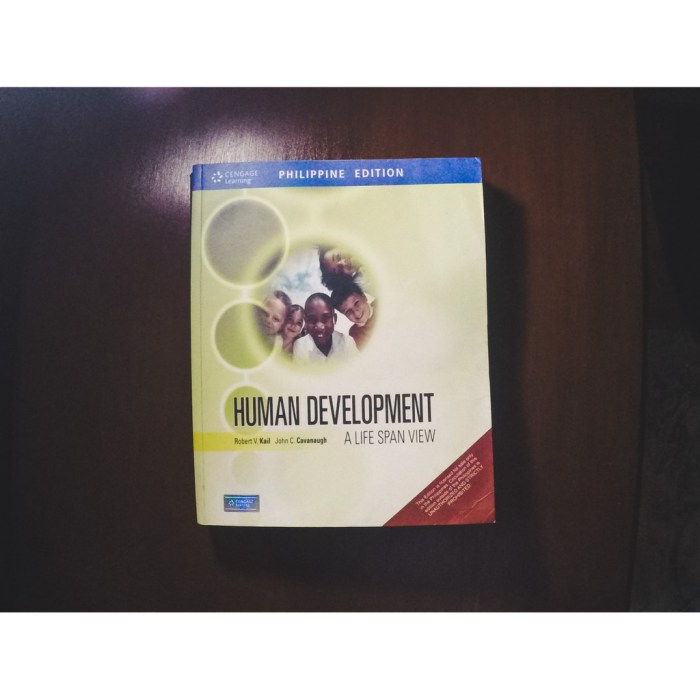Essentials of lifespan development 6th edition – Essentials of Lifespan Development, 6th Edition, delves into the intricate journey of human growth and development across the lifespan. This comprehensive text explores the biological, cognitive, social, emotional, and physical transformations that shape individuals from conception to old age.
Through a multidisciplinary lens, this authoritative guide unveils the complexities of human development, examining the interplay of genetics, environment, and cultural influences. It provides a deep understanding of the major stages of development, from infancy to adolescence, adulthood, and late life, highlighting the unique challenges and opportunities that accompany each phase.
Overview of Lifespan Development
Lifespan development encompasses the physical, cognitive, social, and emotional changes that occur throughout an individual’s life, from conception to death. Key principles include multidirectionality, plasticity, and context.
Major Stages of Human Development
- Prenatal period (conception to birth)
- Infancy (birth to 18 months)
- Early childhood (18 months to 6 years)
- Middle childhood (6 to 11 years)
- Adolescence (11 to 18 years)
- Young adulthood (18 to 40 years)
- Middle adulthood (40 to 65 years)
- Late adulthood (65 years and older)
Biological Foundations of Development

Genetic and Environmental Influences
Genes provide the blueprint for development, but environmental factors also play a crucial role. Epigenetics explores how experiences can influence gene expression.
Prenatal Period
The prenatal period involves significant growth and development, including the formation of major organs and the differentiation of cells.
Physical, Cognitive, and Social-Emotional Development in Infancy and Early Childhood
- Rapid physical growth and motor development
- Emergence of basic cognitive abilities (e.g., object permanence)
- Development of social-emotional bonds (e.g., attachment)
Cognitive Development: Essentials Of Lifespan Development 6th Edition

Piaget’s Theory
- Sensorimotor stage (birth to 2 years)
- Preoperational stage (2 to 7 years)
- Concrete operational stage (7 to 11 years)
- Formal operational stage (11 years and older)
Vygotsky’s Sociocultural Theory
Emphasizes the role of social interactions and cultural context in cognitive development.
Language, Memory, and Problem-Solving Skills
Cognitive development involves the acquisition of language, the development of memory, and the ability to solve problems.
Social and Emotional Development
Major Theories
- Attachment theory
- Self-concept theory
- Social cognitive theory
Development of Attachment, Self-Concept, and Social Competence
- Attachment relationships provide a foundation for social and emotional development.
- Self-concept emerges through social interactions and self-reflections.
- Social competence involves the ability to interact effectively with others.
Influence of Family, Peers, and Culture
Social and emotional development is shaped by family dynamics, peer relationships, and cultural norms.
Physical Development
Physical Changes Throughout the Lifespan
- Rapid growth in infancy and childhood
- Puberty and sexual maturation in adolescence
- Gradual decline in physical abilities in late adulthood
Impact of Nutrition, Exercise, and Sleep, Essentials of lifespan development 6th edition
Physical development is influenced by nutrition, exercise, and sleep, which affect growth, body composition, and overall health.
Role of Physical Development in Overall Health and Well-Being
Physical development contributes to overall health, mobility, and independence throughout the lifespan.
Developmental Psychopathology

Concept and Major Perspectives
Developmental psychopathology focuses on the development of mental disorders and their risk factors.
Risk Factors and Protective Factors
- Genetic predisposition
- Environmental stressors
- Resilience and coping mechanisms
Assessment and Treatment
Developmental psychopathology involves the assessment and treatment of mental disorders, considering developmental factors.
Applications of Lifespan Development
Practical Applications
Lifespan development principles have applications in various fields, including education, social policy, and healthcare.
Importance for Professionals
Understanding lifespan development is crucial for professionals working with individuals of all ages, as it helps them tailor interventions and support to specific developmental needs.
Examples of Applications
- Age-appropriate educational practices
- Social policies that support families and children
- Healthcare interventions that promote healthy aging
Common Queries
What is the significance of understanding lifespan development?
Lifespan development provides a comprehensive framework for understanding human growth and change throughout the lifespan. It enables professionals to tailor interventions and support strategies to the unique needs and challenges of individuals at different stages of development.
How does culture influence lifespan development?
Culture plays a significant role in shaping development by influencing values, beliefs, and socialization practices. Cultural factors can impact cognitive development, social competence, and emotional regulation, among other aspects of human development.
What are the key risk factors for developmental disorders?
Risk factors for developmental disorders include genetic predispositions, environmental stressors, and adverse experiences during critical periods of development. Early identification and intervention are crucial for mitigating the impact of these risk factors.